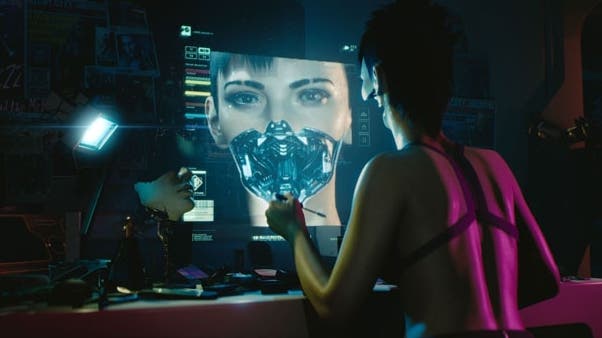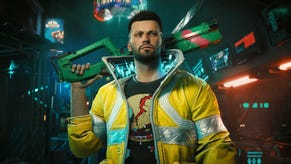William Gibson was bang on about Cyberpunk 2077 and Grand Theft Auto
Feel the chemistry.
You'd think if anyone had an interesting take on a game like Cyberpunk 2077 it would be William Gibson. And sure enough, @GreatDismal had a verdict on the trailer pretty early in proceedings yesterday: "The trailer for Cyberpunk 2077 strikes me as GTA skinned-over with a generic 80s retro-future," he wrote, "but hey, that's just me."
And that's the thing about a great writer, isn't it? Their thoughts are generous. Because unconsciously the thing that struck me about Cyberpunk 2077's trailer when I first watched it, the thing that made me lean forward and rewatch it almost instantly, is that it truly is a bit like GTA. This may not be what Gibson was getting at, but that trailer had the crucial things that make GTA successful, I think: it had a confidence in the world it had created and the richness and density of that world. It trusted the world to do the talking.
Compare the Cyberpunk trailer to the Just Cause 4 trailer. Just Cause 4 will be, I am sure, a banger, but look at what the trailer does: it tells you explicitly what you will do in the game. You will have the parachute again! You will have the hook! You will tie things together and watch them explode. You will drive different vehicles and cause them to explode. You will fight the world's most dangerous private army. You will fight a tornado! You will probably get to explode a tornado. Rico may be doing the talking, but the game is shouting at you throughout: look at the stuff you will soon be doing!
Cyberpunk is a bit different. Sure, there are guns and hold-ups and, as Johnny has discovered brilliantly, more than a little of a steer on the plot. But this is a trailer where your eye is drawn to the background rather than the foreground, and this feels intentional. Cyberpunk's trailer isn't bothering to tell you again and again about brain-hacking and blowing people away and being the baddest man in town because all that goes without saying. Instead, it's showing you the world through its incidental details. It is allowing you to build up a sense of the place through the things that are not at the centre of the frame.
So you're the cool guy on the train at the start. Nice jacket! Nice subway map! But neither of these things is the point of this scene in the trailer, and neither is the commuter being harrassed and toyed with by members of what looks like a street gang. The point of this scene is the person sat next to the harassed commuter scrolling idly through images on their phone, because this sort of thing happens all the time, because this is a place where you are taught to mind your own business so much that you don't even have to force the air of idleness anymore.
Throughout the rest of the trailer these are the details that shine - the posh lady getting out of her flying car thing, contrasted with the hillbilly couple, the woman with most of her face off (propped, handily, on the table nearby), the robo-boxing gym.
Some of this is telling you about stuff you'll do in the game, sure: you'll drive a cool car, you may get to operate a dog drone or two, and something very bad is going on in the corporate world. But so much more is just telling you about the world itself. It's coherent, too. Again and again - the kid playing VR, the guy on the train or whatever it is wryly enjoying his drink while attendants just across the aisle try to help a man whose brain is apparently on fire - you're being told that this is a future where the only way to get by is to retreat into your own bubble. It is the future of our present moment: People scroll through phones, they have conversations about their own affairs inches away from human tragedy. The world comes at you not in its mechanics, in the way that Just Cause's trailer operates, but in the shrugging richness of its context.
Know another game that did this? GTA 5, whose reveal trailer, sure, introduced the main characters and showed off heists and gunplay and carjacking. But it also had joggers checking each other out, homeless people massed under a freeway on ramp, and most of all - the one image that stood out at the time and stands out still as being so perfectly attuned to the context of the era - the guy hammering the foreclosure sign into the ground outside the house. At the time, people speculated that this meant you'd be able to buy properties in the game. And so it was. But that's not what this scene is about, any more than the opening scene of the Cyberpunk trailer is telling you that, hold tight, you'll be able to ride the subway.
Confidence, in the richness of the world, in the sharpness and vividness of the detailing, and in the little human horrors that bring life to this fairly well-travelled genre. And you see this confidence perhaps most clearly, it now strikes me, in the fact that Cyberpunk 2077 chose to present Night City during the time that almost never comes to mind when you think of the dystopian urban future - the daytime.










